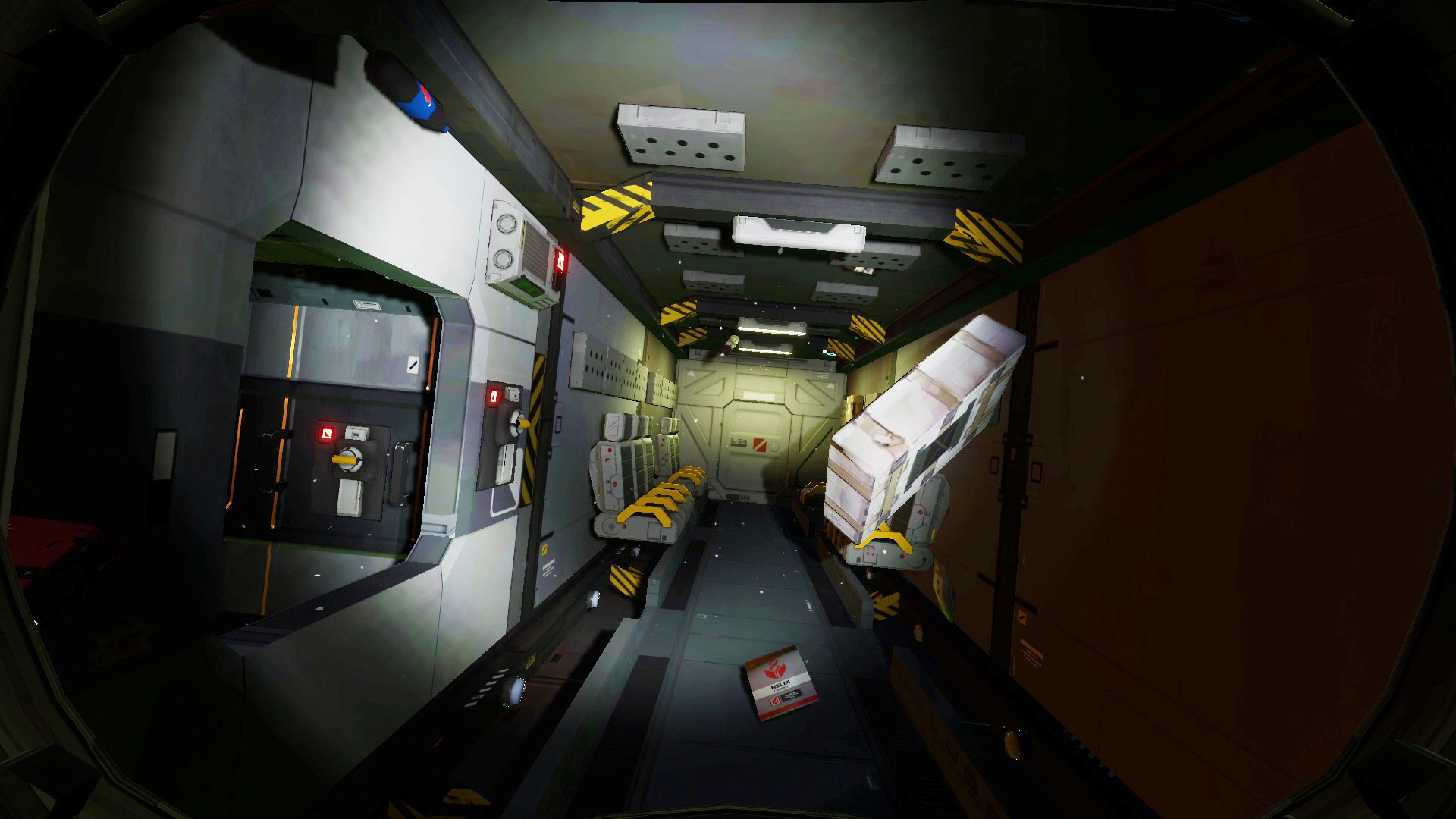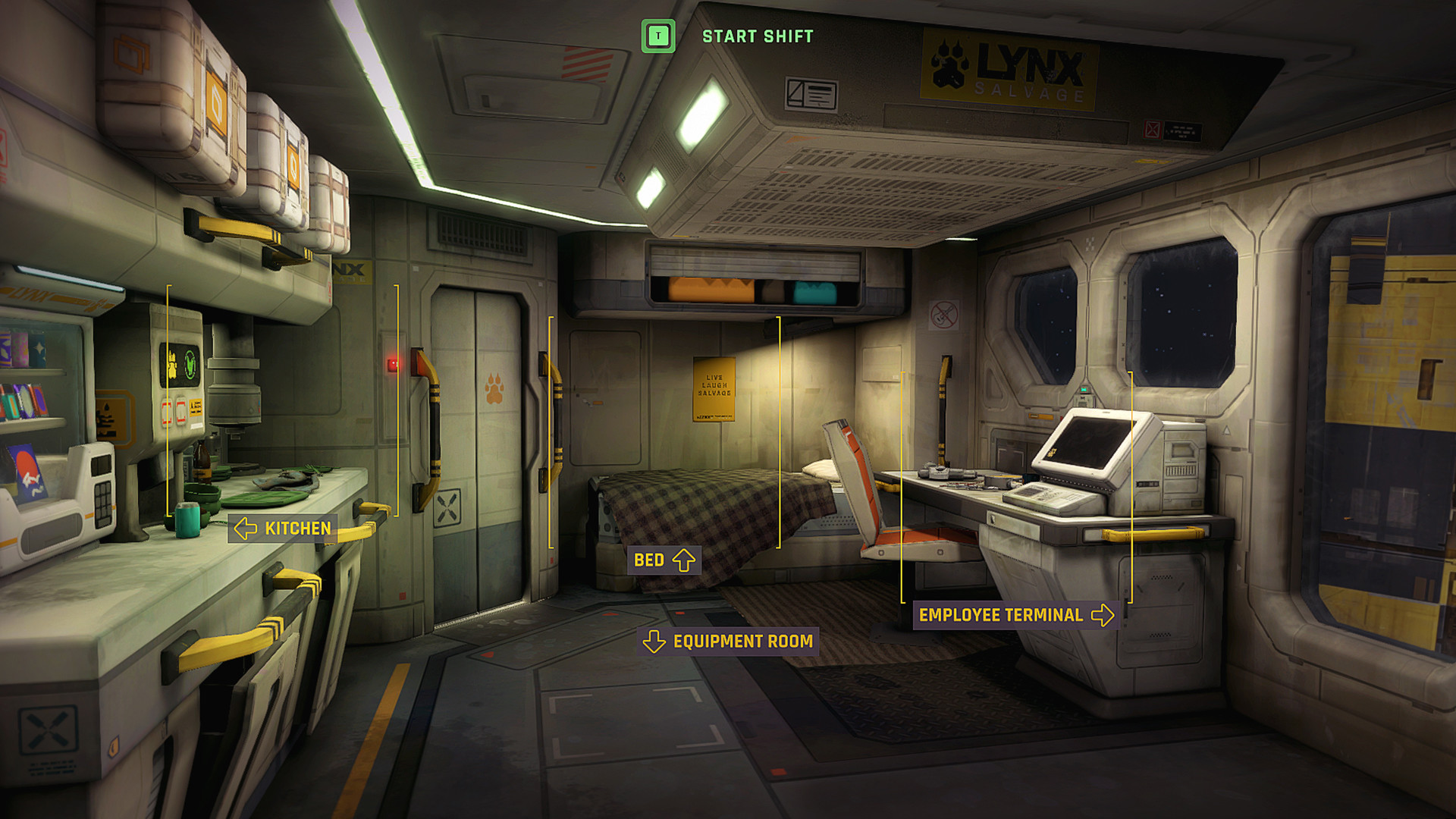My grandfather was born in Alliance, Ohio, a rural farming town which transitioned to a manufacturing economy in the 20s. He grew up working a farm, considered dropping out of high school (but didn’t), and, when his family’s farm went under and was purchased by a corporate farming enterprise, he went to the machine shops that came to define the town. There, he operated a manual mill, a highly technical instrument capable of machining pieces of metal to millimeters of precision. His shop, asbestos ridden, gave him the cancer which killed him forty years later, when I was 17.
I have never been to his grave.
Videos by VICE
In Hardspace: Shipbreaker, you play a futuristic laborer tasked with salvaging derelict spacecraft for the massive Lynx Corporation. To do so, you use grapple beams, laser cutters, and demolition charges to systematically disassemble huge, incredibly dangerous space craft.
Over the course of the game’s 20 hour campaign, you disassemble dozens of ships in the hopes of paying off the 1.2 billion dollars of debt you owe the company in exchange for the supposed right to work. During that time, you will inevitably die, but death doesn’t grant shipbreakers even a short break from work. Your body will be cloned, and your consciousness instantly transferred to it so you can finish your shift. For shipbreakers, not even death provides a respite.
Hardspace: Shipbreaker’s writing is not particularly subtle. Weaver, your shift leader, gives you a ship he purchased years ago within the first five hours of the game. This mentor-esque relationship feels so rushed as to be nigh nonexistent, but facilitates a side quest, which sees your character slowly repairing a broken ship with parts scavenged from those you yourself break. The same goes for Lou, a union organizer who invites you to the union’s newsletter within moments of meeting you. These conversations, which occur entirely over the radio or as transmissions to your personal computer, are shorthand for implied relationships which develop over long hours at the yard, but the game’s overall pacing undercuts this intent.

While Hardspace: Shipbreaker doesn’t invest a lot of time in developing its characters to make them feel like anything resembling real people, its setting is excellently crafted through a mix of collectable data drives, email, small pieces of corporate flavor text, and the growing set of tools and dangers you’ll need to navigate in order dismantle increasingly complex ships.
In Hardspace: Shipbreaker, the economic devastation of Earth drives you to the Lynx Corporation, and the orbital company town of the shipyards. It would be easy to see this as a satirical reference to the company towns of the late 19th and early 20th centuries, but this reading would ignore the ways in which corporations have come to define the very structure of modern urban design.
The town I grew up in did not begin to die when the factories closed, their closing only revealed an already infected wound. The American factory economy is built on low wage, “unskilled” labor, in predominantly low cost of living areas. Keeping the quality and cost of living low is actively beneficial for owners. It maximizes not only profits, but leverage over your workers. Desperation is a powerful motivator.
As such, it is in a company’s best interests to actively limit the economic mobility of the area directly surrounding its factory. This takes many forms, from the low value of homes in areas zoned for industry, to the development of a closed local culture and economy. These practices fulfill the same purpose of maximizing corporate leverage over workers.
Hardspace: Shipbreaker’s company towns are not a satire or return to form, but a continuation of modern practices, as is its depiction of debt slavery.
Despite the strength of its setting, Hardspace: Shipbreaker’s most prescient critiques lie at the core of its systems. The game’s progression being the most obvious example. Forward progress in Hardspace means two things, better equipment and more difficult (read: hazardous) ships.
Improved equipment is purchased with company scrip, known as Lynx Tokens, which is earned by achieving salvage quotas. These upgrades, in their early levels, make your tools markedly safer. Improved laser range means you’re less likely to burn yourself or be caught in an explosion, slower durability drain means less critical malfunctions, and the game’s demo charges are virtually unusable without reducing their blast radius from a massive 3m, down to just .25m. That difference in radius is all that separates a clean cut from a reactor meltdown. The final unlockable upgrade for each tool is the right to purchase it, meaning the cost of renting the tool is no longer deducted from your pay.

The key to all of this is that safer equipment is locked behind productivity. The work is not dangerous by its nature, but by the material conditions it is done in, and the instruments you use to do it.
Additionally, your training gets worse as the game goes on and you are introduced to increasingly complex ship components. During the game’s first act, your team lead Weaver provides an exhaustive explanation of the various parts of every ship and every new system you encounter. Once you reach a high enough certification level for Act Two to begin, Hal, a corporate “administrator” and union buster, appears and begins interrupting Weaver’s explanations of essential game systems. Furthermore, the unlimited time training shifts where you can take your time learning a new system are replaced by standard shifts with marked objectives.
The first time I encountered a Power Cell, a key electrical component that requires the timed removal of several fuses, I electrocuted myself and died after the game’s tutorial was interrupted. The first time I encountered radioactive particulates, I managed to irradiate myself to death. After my spare was generated, and I returned to the ship, I accidentally ignited said particulate, killing myself a second time in the same shift. My tutorial on radioactive materials had happened hours previously, in a rushed conversation with no hands-on training.
Lynx has made a conscious decision to make its work unsafe, a decision which serves two purposes. First, it allows the company to keep costs low through negligence. Give people shitty tools, and your average costs go down. Secondly, it allows you to associate danger with valor—and valor is a powerful motivator.

I was there the night my grandfather died. In the hospital staffed by nurses, who graduated from the local university; only two miles away from the small farm on the big hill where they never grew anything and which he refused to leave until he was too sick to breathe, and closer still to the now empty machine shop which killed him.
A primary function of the modern industrial system is to convert towns into tombs. This was the night that I realized that if I did not leave, it would kill me.
Manual labor exists in two semi-contradictory places in the public discourse of capitalism, as unskilled work to be avoided and derided and as dangerous work to be respected. Both positions facilitate poor working conditions, reduced pay, and precarious social standing.
For evidence of the first point, speak to anyone raised in the United States after the 1970s about how college was sold to them. Speaking as a woman who grew up in a small town in rural Ohio, I was promised that university was my way out. To escape a place I hated, the place that killed my grandfather, I would have to go to school to get a “good job.” The alternatives, pitched with derision, were to spend my life working as a cook or manual laborer. These are the only futures I was told to imagine. Manual labor became a threat, a sign of failure and of wasted potential. It isn’t, of course, but that is how it is often framed in daily life and discourse.
For evidence of the second, the public discourse around essential workers at the height of the 2020 COVID-19 lockdown, discussions of police officers as inherently valorous for supposedly putting themselves at risk (even thought being a police officer is not even one of the 10 most dangerous jobs in this country), and the connection between American masculinity and dangerous work, come to mind. Risk, whether it be financial or physical, is claimed to be rewarded under capitalism. Financial risk begets real profit, and physical risk becomes associated with masculinity. Either way, the valorization of risk produces a justification for a lack of regulation, even direct antagonism to the very concept.
Discovery Channel Host, Mike Rowe, makes as much clear in his show Dirty Jobs, and his TEDtalk on the devaluation of labor and workplace safety. By Rowe’s reasoning, the more dangerous a workplace appears, the more careful workers will be because they don’t want to get hurt. This could just be a critique of security theater, but eventually extends to an attack on regulation as a whole. Rowe’s frustrations with security theater are warranted, but he does not then advocate for an improvement in the material safety of job sites. Despite his stated goal of highlighting hardworking Americans, his television show is predicated on the fact that they are icky. Either way, they become martyrs.

Hardspace: Shipbreaker actively rejects such notions, not only through its mechanics but through its characters. Despite the broad brushstrokes with which she is painted, Lou not only rejects the valor of danger but, through her union organizing, actively advocates for better working conditions for herself and her colleagues. You are the perspective character of Hardspace: Shipbreaker, but Lou feels like the game’s real protagonist. She is the organizer, firebrand, and friend at the game’s heart—and, in spite of everything, she loves the actual work. She does so for good reason.
Many games have embraced the joy at the heart of many forms of labor—most notably sims like Farm Simulator and Truck Simulator. These games have come to define an entire genre, one which finds deep joy in work—it borders on an obsession, but one that is incomplete. These games depict labor, yes, but weightless labor in isolation. Labor that does not break bones and which you do alone. Hardspace: Shipbreaker is unique in the completeness of its portrayal, and the grace with which it depicts that work. Objects float through space in gorgeous arcs, accelerating and decelerating in pace with the wide arcs of your grapple beam. Its reverence towards labor isn’t just aesthetically beautiful, but actively humanizing towards its characters. The joy of shipbreaking isn’t just satisfying gameplay, but an essential part of the game’s core belief in the possibility of a good world in spite of capitalism.
There wasn’t a burial ceremony for my grandfather, just a memorial party.
In the middle of an unused trail a few hundred feet from the high school, from which he was among the first graduating class, there is a mound of concrete and rebar in the woods. The trees are too dense for any machinery, and there have never been any buildings in that area—I’ve checked. It’s just there. Stone and iron, wrapped in ivy and rust. When I return to that town, which I do not call my home, I visit it—an altar to that place, and a memorial for those who were never able to leave.
I stand there, on dead metal and rotten wood, and remember him. When I do, I cannot help but marvel at his unpretentious grace.
More
From VICE
-

Screenshot: Sega -

Screenshot: Shaun Cichacki -

Screenshot: Variable State -

Screenshot: Bethesda Softworks
